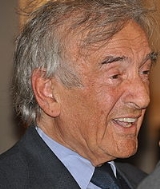
(ˈɛli vɨˈzɛl (In Hungarian
: Wiesel Lázár); born September 30, 1928) is a Hungarian
-born Jewish-American writer, professor, political activist, Nobel Laureate, and Holocaust survivor. He is the author of 57 books, including Night
, a work based on his experiences as a prisoner in the Auschwitz
, Buna, and Buchenwald
concentration camps. Wiesel is also the Advisory Board chairman of the Algemeiner Journal newspaper
.
When Wiesel was awarded the Nobel Peace Prize
in 1986, the Norwegian Nobel Committee
called him a "messenger to mankind", stating that through his struggle to come to terms with "his own personal experience of total humiliation and of the utter contempt for humanity shown in Hitler's death camps", as well as his "practical work in the cause of peace", Wiesel had delivered a powerful message "of peace, atonement and human dignity" to humanity.
Wiesel was born in Sighet, Transylvania
(now Sighetu Marmaţiei
), Maramureş
, Kingdom of Romania
, in the Carpathian Mountains
.
That place, Mr. President, is not your place. Your place is with the victims of the SS.![]()
Indifference, to me, is the epitome of evil.![]()
The opposite of love is not hate, it's indifference. The opposite of beauty is not ugliness, it's indifference. The opposite of faith is not heresy, it's indifference. And the opposite of life is not death, but indifference between life and death.![]()
No one is as capable of gratitude as one who has emerged from the kingdom of night.![]()
I swore never to be silent whenever and wherever human beings endure suffering and humiliation. We must always take sides. Neutrality helps the oppressor, never the victim. Silence encourages the tormentor, never the tormented.![]()
Close your eyes and listen. Listen to the silent screams of terrified mothers, the prayers of anguished old men and women. Listen to the tears of children. Jewish children, a beautiful little girl among them, with golden hair, whose vulnerable tenderness has never left me. Look and listen as they walk towards dark flames so gigantic that the planet itself seemed in danger.![]()
What is abnormal is that I am normal. That I survived the Holocaust and went on to love beautiful girls, to talk, to write, to have toast and tea and live my life — that is what is abnormal.![]()
When a person doesn't have gratitude, something is missing in his or her humanity. A person can almost be defined by his or her attitude toward gratitude.![]()
For me, every hour is grace. And I feel gratitude in my heart each time I can meet someone and look at his or her smile.![]()

